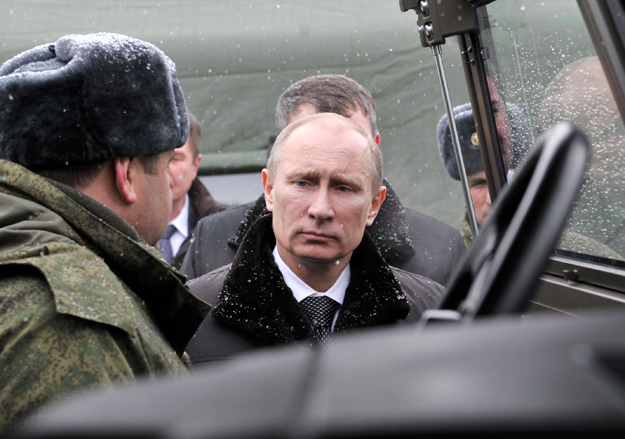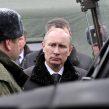
Putin Struggles to Maintain Real Military Rearmament
Publication: Eurasia Daily Monitor Volume: 10 Issue: 221
By:

Russian President Vladimir Putin has conducted an intensive series of meetings with the domestic defense industry and adopted measures to fine officials for state defense order failures. Putin held discussions on issues and challenges around the rearmament of the military across all arms and branches of service. The driving factor in these high-level meetings, as well as deeper concern about the progress of the military modernization process, stems from the unprecedentedly high defense expenditures rising from 600 billion rubles ($18 billion) in 2003 to 2.3 trillion rubles ($70 billion) in 2013. According to a critical commentary in Vedomosti (December 3), Putin’s meetings with the defense industry indicate that the appointment of a new defense minister in November 2012 and a “military-industrial” deputy prime minister has failed to solve the problems of rearmament.
On November 29, Putin concluded his series of three meetings in Sochi with defense officials, leaders and representatives of defense companies, and military commanders. Putin stated, “We had a very substantive and pragmatic discussion. I would like to note that the momentum our work has taken on is good. The discussion was, as I already said, substantive and sometimes—as we say in such cases—forthright, but we always had the same perspective: that the objectives we have set must be reached; and reached effectively and within the time frame that our country requires.” According to the Russian president, these meetings were the first of their kind, and the format permitted analysis of “all aspects” of defense procurement, including a comparison of progress in differing branches of service and in companies involved in the process (kremlin.ru, November 30).
While there was no reporting on the actual content of these discussions, the extent of the disarray that lies at the heart of Russia’s military modernization is impossible to conceal, especially in the context of the financial corruption scandal in the defense ministry surrounding Anatoly Serdyukov, the former defense minister. The outsourcing of military supply services to the ministry-linked holding company Oboronservis was essentially Serdyukov’s brainchild. Therefore, it was impossible to expunge his involvement in the loss to the state budget. Serdyukov has now officially been declared a “suspect” in the case, though the chances of him serving a prison sentence remain low; it appears the charge is “negligence” and the head of state is likely to somehow ensure his freedom (https://sledcom.ru/actual/367950/).
The problem of the Russian State Armament Program to 2020 and its success or failure to modernize the conventional Armed Forces has little to do with Serdyukov’s fate. However, the current minister of defense, Army-General Sergei Shoigu, has enacted two policy reversals linked to Serdyukov’s approach to outsourcing and rearmament (https://www.vedomosti.ru/opinion/news/19536111/oruzhie-prezidenta).
First of all, Defense Minister Shoigu was ending the policy of seeking foreign technology apart from the Mistral procurement. While the second major policy reversal is to gradually withdraw the defense ministry from “commercial activities.” The role of the main army supplier is assigned to the Federal Agency for Supplies of Armaments, Military and Specialized Materiel (Rosoboronpostavka). Mikhail Ivanov, deputy head of the agency, confirmed this latest policy shift: “Starting next year, the defense ministry has decided to entrust Rosoboronpostavka with placing orders not only with respect to the state defense order but also across the entire range of Ministry of Defense procurement for our Armed Forces.” The choice of companies that are ready and are able “within the agreed schedule” and at the “contractually stipulated prices” to provide the Armed Forces with quality products—whether it is equipment, weapons, food or fuel—will all be handled by Rosoboronpostavka. However, these policy twists cannot fix the 2013 defense order. According to Deputy Defense Minister Yuriy Borisov, a number of industry enterprises failed to meet the schedule for the fulfillment of military contracts. Yet, Borisov highlighted the underlying malaise in the lack of defense industry companies able to supply weapons and equipment for the military; in his view, they simply do not have the production capacity of the qualified personnel needed (Rossiyskaya Gazeta, November 22).
Yet, the real hammer blow to the modernization program has come from Shoigu’s reversal of his predecessor’s efforts to access foreign military technology for the Russian Armed Forces. Ruslan Pukhov, the director of the Moscow-based Center for the Analysis of Strategies and Technologies believes this to be a critical factor; Pukhov characterizes the domestic defense industry as effectively “frozen,” since it needs “foreign scientific and design developments.” Even if Russian intelligence agents can successfully steal foreign military technology [such efforts] will not yield any breakthrough, as the “institutes and specialists” that could provide the correct implementation of foreign technologies have been lost (https://www.vedomosti.ru/opinion/news/19536111/oruzhie-prezidenta).
Putin’s involvement in finding a path through this mess and resolving the issues between the defense ministry and defense industry are clearly critical. But for the time being it seems, his efforts are restricted to holding meetings and passing punitive changes to the administrative offences code. On December 2, Putin signed a change to the law that targets the defense industry and specifically tightens up the rules on breaches of procedure linked to defense contracts. It states that “the breach by an official […] of the procedure for setting the initial (maximum) price of a state contract under the state defense order, if the state defense order is placed through an auction, leads to the imposition of an administrative fine of 30,000 rubles to 50,000 rubles on the official concerned.” Similar sized fines may be imposed on defense industry personnel for a wide range of breaches, and in cases of a violation of the state defense order, an official can be banned for three years (Interfax, December 2).
While the Russian Armed Forces are clearly moving ahead with procurement, the speed of modernization and its quality remain key concerns (https://expert.ru/2013/12/5/pochti-sovetskij-temp/). In this complex process, Putin is the supreme arbiter, but for too long he has sided with the vested interests of defense company leaders. Putin’s latest round of meetings in Sochi and his changes to the administrative code to allow defense officials to be fined in some cases scratches the surface of the problems. None of this addresses what Pukhov highlights as the lack of access to foreign military technology, nor does it tackle the dearth of industry capacity.




